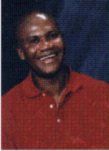
A Symbol of Liberian Tragedy and Hope: A Memorial
to Sumowuoi Pewu
William E. Allen, Ph.D.
The Perspective
Atlanta, Georgia
November 4, 2005
 |
| Sumowuoi Pewu |
It was immediately obvious that in spite of the heavy-handedness of the Doe government, Pewu remained unintimidated. His blunt talk about the regime’s human rights abuses was not confined to the seclusion of my office. Out on campus, Pewu openly challenged the handful of pro-Doe supporters or the “agent provocateurs” as they were dubbed. As a result, he became embroiled in long polemics about Doe’s excesses, at times charging that the agent provocateurs merely engaged in pointless “verbal calisthenics,” rather than discussing the real issues. This was Pewu’s nature: forever ready to engage in heated debates about socioeconomic injustice in the Liberian society. His critique could be blunt and scathing, but it was always meant for emphasis, not to ridicule his opponents. In a free society, Pewu’s somewhat abrasive approach would have been welcomed and encouraged because it contributes to the national debate. The tragedy was that this form of open debate, the Socratic discourse so essential to the promotion of democracy, has been largely suppressed in Liberia, more stringently under dictator Samuel Doe and exiled former president Charles Taylor.
In the United States, Pewu remained actively engaged in the debate on the new direction for Liberia. He was optimistic that with the right leaders, Liberians could enjoy unfettered freedom. At times, his strong arguments and counter-arguments placed him at odds with friends, as he would not hesitate to point out what he saw as errors or inconsistencies in their positions. Usually however, his arguments were intended to force a dialogue, not to deride the opposition. It was Pewu’s hope that qualified Liberians could lift the nation from the destruction. That hope, which Liberians shared, motivated him to constantly provoke the national dialogue. Lately, I have often thought about Pewu as Liberians prepare to cast their votes in the November 8, 2005 runoff presidential election. This is the day he had longed to see, a day when Liberians freely took their destiny into their own hands.
Sadly, Sumowuoi Pewu lived the tragedy, he conceptualized the hope, but distressingly death robbed him of the opportunity to see the hope come to fruition. One can only wish that as Liberians cast their votes next Tuesday in the critical runoff election, they will do it consciously by recognizing that many Liberians, including Sumowuoi Pewu, fought incessantly for this day but did not live to see it. The Liberian electorate can honor that responsibility by casting their votes for an enlightened, experienced, and qualified president who has the wherewithal to put our beloved Liberia on the road to recovery and remove it from the list of failed states.
About the Author: Dr. William E. Allen teaches history at Georgia Perimeter
College in Atlanta, Georgia.
